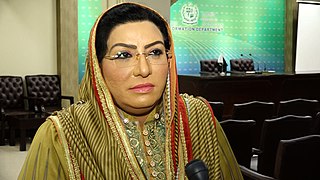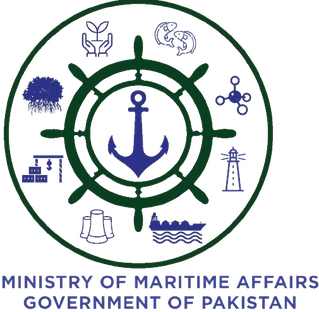
The Ministry of Finance is a cabinet-level ministry of the government of Pakistan that is in charge of government finance, fiscal policy, and financial regulation. A Finance Minister, an executive or cabinet position heads it. The Minister is responsible each year for presenting the federal government's budget to the Parliament of Pakistan.
A health minister is the member of a country's government typically responsible for protecting and promoting public health and providing welfare and other social security services.
A health department or health ministry is a part of government which focuses on issues related to the general health of the citizenry. Subnational entities, such as states, counties and cities, often also operate a health department of their own. Health departments perform food inspections and other health related inspections, vaccination programs, free STD and HIV tests, tobacco enforcement and cessation programs, and other medical assistance programs. Health departments also compile statistics about health issues within their area. The role of a health department may vary from one country to the other, but their primary objective is always the same; safeguarding and promoting health. In 1986, several of the world's national health departments met to establish an international guideline by which health departments operate. The meeting was in Ottawa, Ontario, Canada, and hence the guidelines established are known as the Ottawa Charter. The Ottawa Charter was designed to 'achieve Health for All'.

The Government of Pakistan, constitutionally known as the Federal Government, commonly known as the Centre, is the national authority of the Islamic Republic of Pakistan, a federal republic located in South Asia, consisting of four provinces and one federal territory. The territories of Gilgit-Baltistan and Azad Kashmir are also part of the country but have separate systems and are not part of the federation.
Pakistan Medical Research Council (PMRC), (Urdu: ہیئتِ پاکستان برائے تحقیقاتِ صحت) formerly known as the Pakistan Health Research Council (PHRC) is an autonomous research agency of Government of Pakistan under the Ministry of National Health Services, Regulation and Coordination in the field of medical and health sciences. It was established in 1962.

The Ministry of National Health Services, Regulation and Coordination is a cabinet level ministry of the government of Pakistan with responsibility for national public health.
The Eighteenth Amendment of the Constitution of Pakistan was passed by the National Assembly of Pakistan on April 8, 2010, removing the power of the President of Pakistan to dissolve the Parliament unilaterally, turning Pakistan from a semi-presidential to a parliamentary republic, and renaming North-West Frontier Province to Khyber Pakhtunkhwa. It also gave self-governing, legislative and financial autonomy to provincial authorities. The package was intended to counter the sweeping powers amassed by the presidency under former presidents General Pervez Musharraf and General Muhammad Zia-ul-Haq and to ease political instability in Pakistan. The bill reversed many infringements on the Constitution of Pakistan over several decades by its military rulers. The amendment bill was passed by the Senate of Pakistan on April 15, 2010 and it became an act of parliament when President Asif Ali Zardari signed the bill on April 19, 2010. It was the first time in Pakistan's history that a president relinquished a significant part of his powers willingly and transferred them to parliament and the office of the prime minister.

The Ministry of Interior is a Cabinet-level ministry of the Government of Pakistan, tasked and primarily responsible for implementing the internal policies, state security, administration of internal affairs involving the state.

Firdous Ashiq Awan is a Pakistani politician from Istehkam-e-Pakistan Party. She has served as Special Assistant to Prime Minister on Information and Broadcasting from 2019 to 2020, Federal Minister for National Regulations and Services from 2012 to 2013, Federal Minister for Information and Broadcasting from 2011 to 2012 and as Federal Minister for Population Welfare from 2008 to 2010. She served as the Special Assistant to the Chief Minister of Punjab on Information and Culture, in office from November 2020 to 6 August 2021.

Constitution Avenue, also known as Shahrah-e-Dastoor, is a major north-south avenue in Islamabad, Pakistan that passess through the Red Zone. Its north end meets with the Khayban-e-Iqbal intersection and south end with an intersection of Srinagar Highway.

The Education Secretary of Pakistan is the Federal Secretary for Ministry of Federal Education and Professional Training. The position is occupied by a BPS-22 grade officer, usually belonging to the Pakistan Administrative Service.
The National Council for Homeopathy (NCH) is an autonomous body constituted to regulate the education and registration of homeopathic medical practitioners in Pakistan.

Department of Health is a department of Government of Balochistan, Pakistan. The department is a standard body for providing public health, medical education, training and employment in the Balochistan.

Shahzada 'Prince' Jamal Nazir is a Pakistani politician. In 2011, he was appointed by Prime Minister Syed Yousaf Raza Gilani as adviser with the status of Federal Minister of State for the Ministry of National Regulations and Services. In 2013, he served in the interim cabinet as the Federal Minister for four ministries that included Ministry of Religious Affairs, Ministry of National Interfaith Harmony, Ministry of National Health Services Regulations & Coordination, and Ministry of National Heritage & Integration. Currently, he is serving as Member National Commission on Minorities as a former Minister for National Interfaith Harmony.

The Federal Medical and Dental College is a medical school located in Islamabad, Pakistan. The college gives admission to 110 Bachelor of Medicine and Bachelor of Surgery (MBBS) students each year.

Pakistan Secretariat serves as the headquarters for the Cabinet and Government of Pakistan. It is located on Red Zone in Islamabad, Capital Territory, Pakistan.

The Ministry of Maritime Affairs, previously known as the Ministry of Ports and Shipping, is a Federal Ministry of the Government of Pakistan. The current Minister for Maritime Affairs is Qaiser Ahmed Sheikh and the current Federal Secretary for Maritime Affairs is Zafar Ali Shah. The longest-serving Federal Secretary for Ports and Shipping are Muhammad Saleem Khan and Rizwan Ahmed. The Ministry is headquartered in Islamabad and its main attached departments are in the port city of Karachi.

The Federal Secretary is the highest-ranking position in the Government of Pakistan, occupied by the most senior civil servant in a specific ministry or division. The secretary is the administrative head of that ministry or division and oversees and enforces public policy matters. The authority for the creation of this post solely rests with the Cabinet of Pakistan. The position holder is a BPS-22 grade officer, usually belonging to the Pakistan Administrative Service.

Dr. Nausheen Hamid is a Pakistani politician and social activist who was a member of the National Assembly of Pakistan from August 2018 till January 2023. She is a current Parliamentary Secretary for the Ministry of National Health Services, Regulation, and Coordination, in office since September 2018.
Aamir Mehmood Kiani is a Pakistani politician who served as Federal Minister for National Health Services, Regulation and Coordination, from 20 August 2018 to 18 April 2019. He had been a member of the National Assembly of Pakistan from August 2018 till January 2023.











